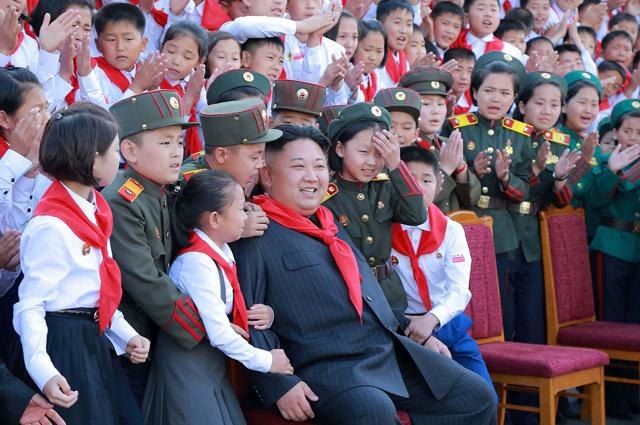You are here
North Korea fires volley of cruise missiles, fifth test in a month
By AFP - Jun 08,2017 - Last updated at Jun 08,2017

This photo taken on Tuesday and released from North Korea's official Korean Central News Agency on Thursday shows North Korean leader Kim Jong-un (centre) at a photo session with the participants in the 8th Congress of the Korean Children's Union in Pyongyang (AFP photo)
SEOUL — North Korea launched a volley of surface-to-ship cruise missiles off its east coast Thursday, Seoul's defence ministry said, Pyongyang's fifth test in less than a month in defiance of global pressure to rein in its weapons program.
The launches came less than a week after the United Nations expanded sanctions against Kim Jong-un's regime in response to recent ballistic missile tests.
"North Korea fired multiple unidentified projectiles, assumed to be surface-to-ship cruise missiles," the defence ministry said, adding the short range missiles flew some 200 kilometres before falling into the Sea of Japan.
Pyongyang has ordered three ballistic missile launches, a surface-to-air missile, and Thursday's cruise missile tests since the South's President Moon Jae-in took power in early May.
Moon advocated reconciliation with Seoul's isolated, unpredictable neighbour but has taken a more stern position in the wake of the missile tests, which pose a policy challenge to the left-leaning leader.
"The only thing North Korea will earn through provocations is international isolation and economic hardship, and it will lose opportunities for development," Moon said at a meeting of the national security council Thursday, according to Blue House spokesman Park Soo-hyun.
Seoul "will not take a single step back or make compromises over the issue of national security or the safety of its people", Moon said, according to his spokesman.
Thursday's launch "was aimed at showing off various missile capabilities and antiship precision strike capability", a spokesman for South Korea's Joint Chiefs of Staff told reporters, adding it did not appear to have violated UN sanctions.
Cruise missile tests do not contravene UN regulations, Korea Defence Network analyst Lee Il-woo told AFP, adding they were "much slower than ballistic missiles and can be shot down by anti-aircraft guns".
Any North Korean tests using ballistic missile technology are banned by UN resolutions.
"North Korea is carrying out carefully calibrated provocations... but restraining from ICBM tests or nuclear explosions which could bring about military retaliations by (US President Donald) Trump," he added.
Thursday's launch is also aimed at pressuring Seoul and Washington ahead of a planned summit between Moon and Trump late June, said Hong Hyun-ik, analyst at the Sejong Institute think tank.
"The North is trying to flaunt its presence... and to pressure Moon to offer a big favour in order to ease tension, like the resumption of a joint economic project," Hong said.
The UN Security Council last Friday unanimously adopted a US-drafted resolution imposing new targeted sanctions on a handful of North Korean officials and entities, a move Pyongyang said was "mean".
China, the reclusive regime's sole major ally, has made it clear that a push for talks — and not more sanctions — is its priority.
"Talks deserve another chance and peace is still within our grasp," Beijing Foreign Ministry spokeswoman Hua Chunying said on Thursday.
The new tests came a day after South Korea suspended deployment of a controversial US missile shield — an apparent concession to China, which is strongly opposed to the Terminal High Altitude Area Defense (THAAD) system.
'Provocative actions'
"North Korea has been stepping up missile tests... in order to project an image to the world that international sanctions can never bring it to its knees," Professor Yang Moo-jin of the University of North Korean Studies told AFP.
"It is also expressing displeasure of the arrival of a US nuclear submarine in South Korea."
The 6,900-tonne USS Cheyenne, whose home port is Pearl Harbor, arrived in the South Korean port of Busan Tuesday, as the US steps up its own muscle-flexing in the region.
The North has carried out two atomic tests and dozens of missile launches since the beginning of last year in its quest to develop a missile capable of delivering a nuclear warhead to the continental United States — something President Trump has vowed "won't happen".
Early last month, the North test-fired what appeared to be its longest-range ballistic missile to date, but analysts doubt that the North has developed an ICBM or a nuclear warhead small enough to fit atop a missile.
But most agree that the country has made significant progress under Kim Jong-un, who took power after the death of his father and longtime ruler, Kim Jong-il, in December 2011.
Related Articles
SEOUL — North Korea fired two suspected ballistic missiles into the sea on Thursday, in its first substantive provocation to the new US admi
SEOUL — North Korea fired two "unidentified projectiles" on Thursday — the Thanksgiving holiday in the US — Seoul said, as nuclear talks bet
SEOUL — North Korea said on Tuesday it successfully test-launched an intercontinental ballistic missile (ICBM) for the first time, whi

















